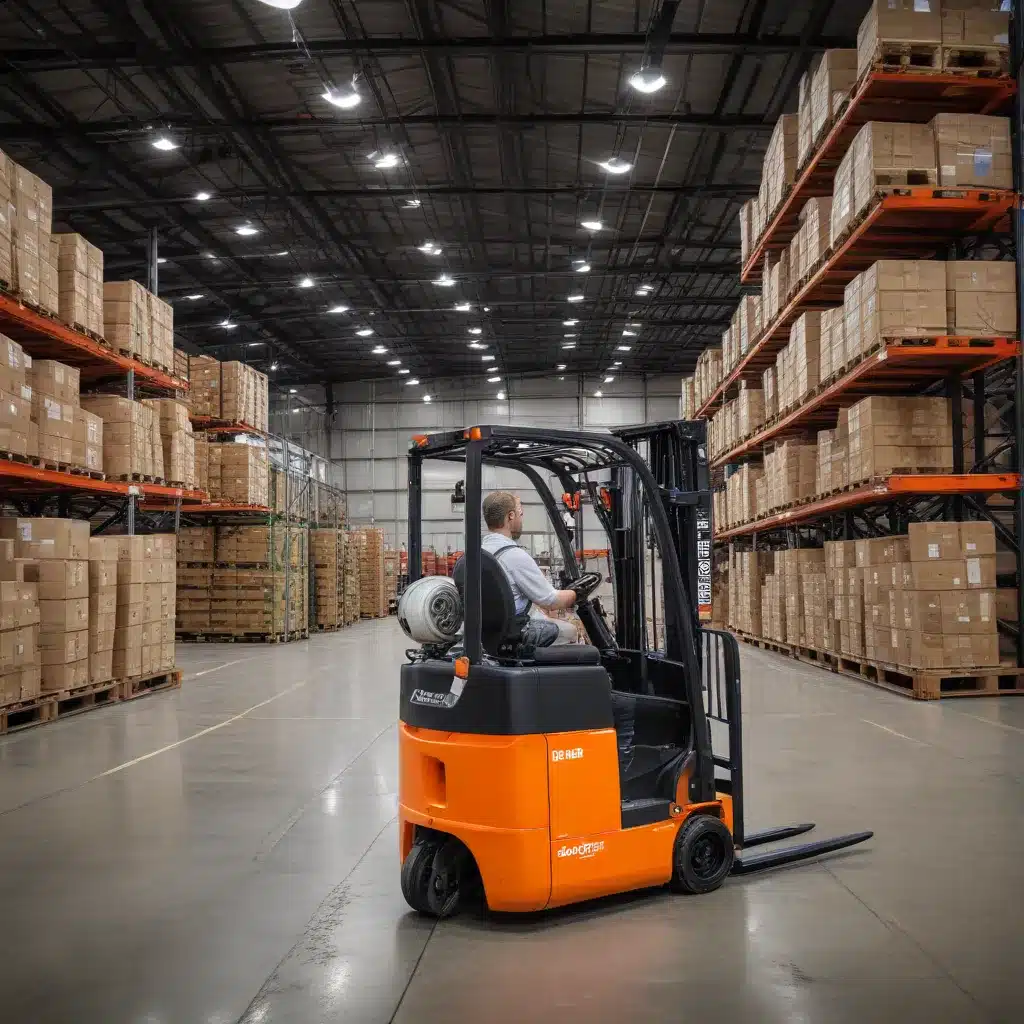
The Shift Towards a Greener Future
The logistics industry is undergoing a profound transformation, driven by the growing demand for sustainable solutions that can reduce environmental impact while maintaining operational efficiency. At the forefront of this shift are electric forklifts, innovative tools that are poised to revolutionize the way we power our warehouses, distribution centers, and supply chains.
As an industry expert well-versed in the nuances of forklift technology, safety, and maintenance, I’m excited to explore the transformative impact of embracing electric forklifts. In this comprehensive article, we’ll delve into the practical benefits, the evolving technological landscape, and the strategies that can help logistics companies spearhead the transition towards a greener, more sustainable future.
The Environmental Imperative
The global push for sustainability has never been more pressing. Governments, consumers, and businesses alike are demanding a reduction in greenhouse gas emissions and a concerted effort to combat climate change. The transportation sector, which accounts for a significant portion of global emissions, has become a critical battleground in this fight.
Electric forklifts offer a compelling solution to this challenge. By eliminating tailpipe emissions, these versatile machines can significantly reduce the carbon footprint of logistics operations. Moreover, their quieter operation reduces noise pollution, creating a more comfortable and productive work environment for employees.
As Amazon’s 2022 Sustainability Report highlights, the e-commerce giant has made substantial investments in electric delivery vehicles, including more than 9,000 electric delivery vans in its global fleet. This commitment to sustainable transportation is a testament to the growing importance of reducing emissions across the entire supply chain.
Technological Advancements Driving Change
The rapid progress in battery technology has been a driving force behind the rise of electric forklifts. Improvements in energy density, charging times, and overall efficiency have made these machines more practical and cost-effective than ever before.
Leading manufacturers, such as Enersys, are at the forefront of developing innovative battery solutions tailored for the logistics industry. These advancements have resulted in electric forklifts capable of longer runtimes, faster charging, and heavier load capacities – crucial factors for seamless integration into warehouse operations.
Furthermore, the expansion of charging infrastructure is crucial for the widespread adoption of electric forklifts. Governments and private companies are investing in building more charging stations, ensuring that logistics operators have the necessary support to power their fleets efficiently.
Operational Efficiency and Cost Savings
Beyond the environmental benefits, electric forklifts offer tangible operational advantages that can enhance the bottom line for logistics companies.
Lower Operating Costs: Compared to their diesel or propane-powered counterparts, electric forklifts have significantly lower fuel and maintenance expenses. The absence of internal combustion engines, oil changes, and other associated costs can translate into substantial savings over the lifetime of the equipment.
Improved Productivity: The instant torque and responsive acceleration of electric forklifts can boost productivity in warehouse and distribution center environments. With no need for warm-up periods or refueling downtime, these machines can maintain a consistent pace, optimizing material handling and order fulfillment.
Reduced Maintenance Requirements: Electric forklifts have fewer moving parts and simpler maintenance requirements, reducing the need for frequent servicing and minimizing operational disruptions. This streamlined maintenance approach can free up resources and allow logistics teams to focus on core business activities.
Forging Ahead: Strategies for Sustainable Logistics
As logistics companies navigate the transition towards electric forklifts, a comprehensive, strategic approach is crucial for success. Here are some key considerations:
-
Assess Your Fleet and Infrastructure: Conduct a thorough evaluation of your existing forklift fleet, considering factors such as usage patterns, load capacities, and operational requirements. Simultaneously, analyze your facility’s electrical infrastructure and identify any necessary upgrades to support the integration of electric forklifts.
-
Embrace Collaborative Partnerships: Forge strategic partnerships with electric forklift manufacturers, charging solution providers, and industry associations. These collaborations can provide access to the latest technologies, best practices, and financing options to facilitate a smooth transition.
-
Incentivize and Educate Your Workforce: Ensure that your employees are equipped with the knowledge and skills to operate and maintain electric forklifts effectively. Offer training programs and incentivize the adoption of these sustainable technologies to foster a culture of innovation and environmental stewardship.
-
Leverage Government Initiatives: Stay informed about government incentives, tax credits, and regulations that support the adoption of electric forklifts and other sustainable logistics solutions. These initiatives can help offset the initial investment costs and accelerate the transition towards a greener future.
-
Measure and Communicate Progress: Implement robust tracking and reporting systems to monitor the environmental and financial impact of your electric forklift fleet. Regularly communicate your sustainability achievements to stakeholders, customers, and the broader industry, showcasing your commitment to eco-friendly operations.
The Future is Electric: Embracing the Forklift Revolution
As we navigate the critical juncture of the logistics industry, the embrace of electric forklifts represents a pivotal opportunity to drive sustainability, enhance operational efficiency, and position your organization as a leader in the green logistics revolution.
By harnessing the transformative power of these innovative machines, you can not only reduce your carbon footprint but also unlock tangible cost savings, improve productivity, and cultivate a more environmentally conscious workforce. The future of logistics is electric, and the time to act is now.
I encourage you to explore the resources available on Forklift Reviews to stay informed about the latest electric forklift advancements, safety guidelines, and industry trends. Together, we can drive the logistics industry towards a sustainable, efficient, and environmentally responsible future.

